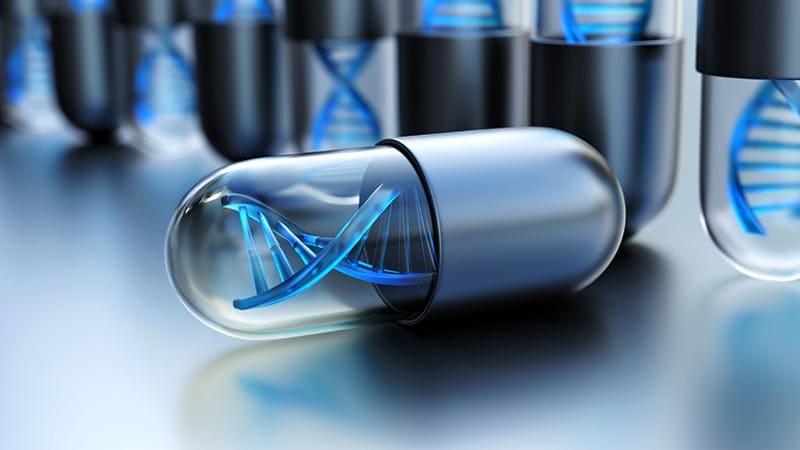Pharmacogenomic Testing Impact on Antidepressants Efficiency
핵심 개념
Pharmacogenomic testing for antidepressants can significantly reduce the time and cost of finding effective medication for patients with major depressive disorder.
초록
The content discusses the impact of pharmacogenomic testing on antidepressant treatment for patients with major depressive disorder. It highlights the development of a microsimulation model to evaluate the effectiveness and cost-effectiveness of pharmacogenomic testing in British Columbia, Canada. The study predicts reduced development of refractory depression, increased time of patients feeling well, and substantial cost savings for the healthcare system over 20 years. The model also shows higher remission rates, lower discontinuation rates, and overall improved outcomes for patients undergoing pharmacogenomic-guided treatment.
요약 맞춤 설정
AI로 다시 쓰기
인용 생성
소스 번역
다른 언어로
마인드맵 생성
소스 콘텐츠 기반
소스 방문
www.medscape.com
Pharmacogenomic Testing for Antidepressants Could Save Time, Money
통계
Testing could result in 37% fewer patients developing refractory depression.
Health system cost-savings of $956 million CAD over 20 years.
23,216 (37%) fewer patients developing refractory depression with pharmacogenomic-guided treatment.
$4926 CAD per patient saved with pharmacogenomic-guided treatment.
15% more time in the "well" state without depression symptoms for patients undergoing testing.
18% less time in the MDD state with recurrent episodes or refractory depression for tested patients.
.064 life-years and .381 quality-adjusted life-years (QALYs) gained per patient with testing.
인용구
"Our study shows that if pharmacogenomic testing guides the prescription of an effective antidepressant, it can reduce the lengthy trial-and-error process many patients experience and dramatically reduce the financial burden on the healthcare system." - Shahzad Ghanbarian, PhD
"These findings provide a solid economic justification for clinical implementation of pharmacogenomic-guided depression treatment in Canada." - Chad Bousman, PhD
핵심 통찰 요약
by Carolyn Cris... 게시일 www.medscape.com 11-15-2023
https://www.medscape.com/viewarticle/998508
더 깊은 질문
How can pharmacogenomic testing be integrated into public health systems effectively?
Pharmacogenomic testing can be effectively integrated into public health systems by first establishing guidelines and protocols for its use. This includes training healthcare professionals on how to interpret and utilize pharmacogenomic test results in clinical decision-making. Additionally, creating partnerships with laboratories or companies that offer these tests can streamline the process of ordering and receiving results. Developing reimbursement strategies to cover the cost of testing for patients who may not be able to afford it out of pocket is crucial for equitable access. Finally, incorporating pharmacogenomic testing into electronic health records can ensure that test results are easily accessible to healthcare providers during the treatment process.
What are the potential drawbacks or limitations of relying solely on pharmacogenomic testing for antidepressant treatment?
While pharmacogenomic testing can provide valuable information about how an individual may respond to certain antidepressants, it is not a foolproof solution. One limitation is that these tests may not capture all genetic variations that could impact drug metabolism or response, leading to potential false negatives or false positives. Additionally, pharmacogenomic testing does not account for other factors that can influence treatment outcomes, such as environmental factors, lifestyle choices, or co-occurring medical conditions. Relying solely on these tests may also overlook the importance of patient-provider communication and shared decision-making in the treatment process.
How can the insights from this study be applied to improve mental health outcomes globally?
The insights from this study can be applied globally to improve mental health outcomes by advocating for the integration of pharmacogenomic testing into mental health treatment guidelines and protocols. Healthcare systems can use the findings from this study to make a case for investing in pharmacogenomic testing infrastructure and training for healthcare professionals. By demonstrating the cost-effectiveness and potential benefits of pharmacogenomic-guided treatment, policymakers and healthcare leaders can prioritize the implementation of these testing strategies. Collaborating with researchers, patient advocates, and industry partners to develop standardized approaches to pharmacogenomic testing can help ensure consistency and quality in mental health care delivery worldwide.
0
